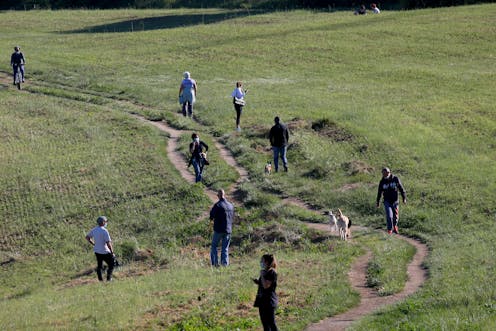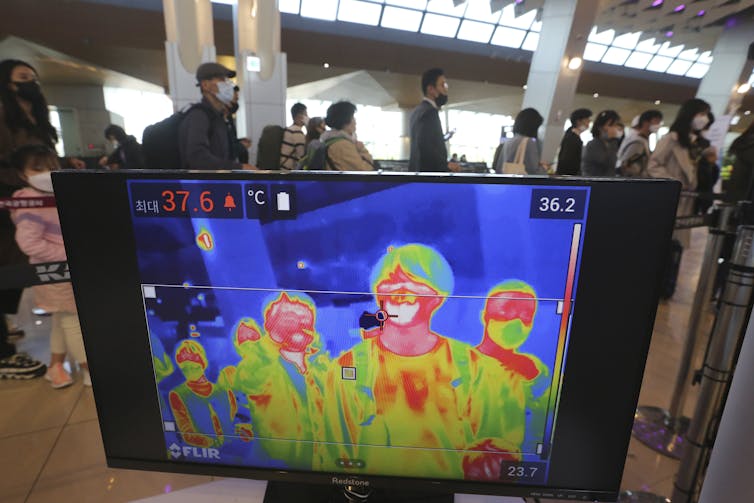Exit from coronavirus lockdowns – lessons from 6 countries
It's possible to evaluate countries' readiness to lift their lockdowns, based on how well they managed the first wave of the pandemic, and how ready they are for a digital economy.

It has been less than two months since the world scrambled to go into the “Great Lockdown” to slow the spread of COVID-19. Now, many countries are considering their exit strategies. Some have already eased up.
The push is largely economic. There is a lot scientists don’t yet understand about the novel coronavirus, and there is no known cure or vaccine. Many countries are still experiencing a rise in infections. But the lockdowns have played havoc with people’s livelihoods. Entire economies are in meltdown: The International Monetary Fund predicts the worst economic downturn since the Great Depression.
Just as each nation chose a different route into lockdown, each is likely to choose its own exit path. I have launched a research initiative, “Imagining a Digital Economy for All 2030,” with a focus on the post-pandemic global economy. We have been studying the characteristics of 40 countries that help explain how governments and citizens have acted to contain the COVID-19 outbreak and their preparedness to take an economy online. Our analysis offers ways to gauge which countries are best prepared for a safe exit.
It seems clear that the safest idea is to reopen slowly, in phases, while remaining ready to reenter lockdown in case of new outbreaks. By looking at how well a nation managed the first wave of the pandemic, and how ready it is to work remotely by falling back onto the online economy, we now understand how prepared nations are to restart economic activity without triggering fresh rounds of public health disasters.
Public health and technology
Not every country is well equipped to ease itself out of a lockdown safely.
A nation’s ability to manage the outbreak relies on many factors: the willingness of governments to take decisive action; citizen compliance in staying home and social distancing; and capacity for adequate testing for the disease, including “contact tracing” – tracking down the people who have been in contact with those infected. Those characteristics are also key to managing future outbreaks.
In parallel, not every country is ready to shift much of its economic activity online. Around the world, not everyone has affordable, reliable internet service; or the jobs, devices and digital apps that would let them work productively from home; or ways to make payments and get public services online. In some countries – though not all – workers who can’t do their jobs remotely can reduce their in-person contact by using digital transactions, whether it is for carry-out food, e-commerce or receiving bailout checks and unemployment benefits.
Countries such as Germany, New Zealand and South Korea are strong in both disease-fighting and digital-economy preparedness. Their economic activity isn’t as dependent on in-person interactions, and authorities can respond quickly if loosened rules result in a spike in cases. In contrast, the U.S., Italy and Japan face different challenges before they can safely lift lockdowns.

Difficulties ahead for the US
Compared to countries worldwide, the U.S. is more prepared to operate parts of its economy online, but its response to the outbreak indicates there may be difficulties after reopening. States were inconsistent in issuing stay-at-home orders, and citizens’ compliance with the rules has varied widely.
Officials have been unable to test in large numbers, and only four states meet, or are on track to meet, the contact-tracing required to control future outbreaks.
The results are evident in the mortality rates in the U.S. and other, better-prepared countries: On May 5, the key statistic shows the U.S. death rate was more than three times that of Germany, nearly 200 times those in New Zealand and South Korea.
What made the difference?
The countries that more efficiently managed this first outbreak and its consequences capitalized on their public health preparation to get a grip on the infection quickly. Germany has a high volume of infections but low mortality. The country only knows this because it had tested extensively – at a rate of 21 people per 1,000, as compared with 9.8 per 1,000 in the U.S.
New Zealand’s government proved willing to rapidly impose severe restrictions on movement and found the public largely supportive and ready to comply.
South Korea, while among the earliest countries affected, kept its mortality among the lowest in the world through widespread testing and deploying technology for widespread contact tracing. Infected individuals’ interactions were retraced using cellphone location data, surveillance camera footage and credit card records. Websites and apps offer details on infected people’s travel and exposure risks.
These approaches may prove hard for the U.S. to replicate. The country is far from having testing rates like Germany’s. New Zealand has a much less polarized citizenry and far more trust in its national leadership than the U.S. The South Korean technology-intensive approach to contact tracing would be considered too intrusive on individual privacy for the U.S.

Troubles for other nations, too
Italy initially underestimated the severity of its outbreak, but then imposed a strict lockdown with high citizen compliance and widespread testing and tracing. However, we found in our study that Italy is among the least prepared European Union members for a shift to a digital economy. Germany, New Zealand and South Korea all have higher levels of internet access and service, digital payments and public services, and employers ready to handle remote work.
Japan’s situation is particularly challenging because it eased up its restrictions too early and then had to impose an emergency to stem additional outbreaks. It is also relatively unprepared in digital terms because of a host of factors, ranging from peer pressure to come into the office, to security concerns, transactions that require a paper trail, often requiring official corporate seals, missing digital infrastructure and a continued aversion to digital payments.
Each of these countries is a wealthy, developed nation, so the differences are not due to affordability. Our research has found that preparedness requires not just funding but also farsighted, credible and transparent leadership and citizens’ trust in that leadership. The first leads to timely and firm decisions, and the second contributes to citizens’ willingness to cooperate with those decisions.
For instance, German Chancellor Angela Merkel’s background as a trained scientist gave her powerful credibility when facing a scientific crisis. New Zealand Prime Minister Jacinda Ardern clearly explained her “go early, go hard” approach to lockdown restrictions, and her citizens agreed. In South Korea, authorities controlled the virus through “decisive and transparent leadership based on data, not emotion.”
As governments seek their own exit pathways, and aim to strengthen areas where they are weak, there’s no way to be completely certain or fully prepared for what might happen next.
In our research, we’ve found one principle that governments might find useful to guide them through the uncertainty. It’s from a former New Zealand prime minister, Helen Clark: “Economies can recover; the dead can’t.”
[You need to understand the coronavirus pandemic, and we can help. Read The Conversation’s newsletter.]
Bhaskar Chakravorti has founded and directs the Institute for Business in the Global Context at Fletcher/Tufts that has received funding from Mastercard, Microsoft, the Gates Foundation, the Rockefeller Foundation and the Onassis Foundation. He is a Non-Resident Senior Fellow at Brookings India and a Senior Advisor on Digital Inclusion at the Mastercard Center for Inclusive Growth.
Read These Next
How the ‘slayer rule’ might play a role in determining who will inherit wealth from Rob Reiner and h
These rules have a long history in the United States. They played a role in the notorious murders by…
The world risks forgetting one of humanity’s greatest triumphs as polio nears global eradication − 7
Polio may finally be defeated in the next 5 years. Will the world recognize what an extraordinary achievement…
Autocracies in transition: In 2025, Cameroon and Tanzania rulers clung to power — but look more vuln
The countries, whose respective leaders recently won widely disputed elections, offer contrasting examples…






